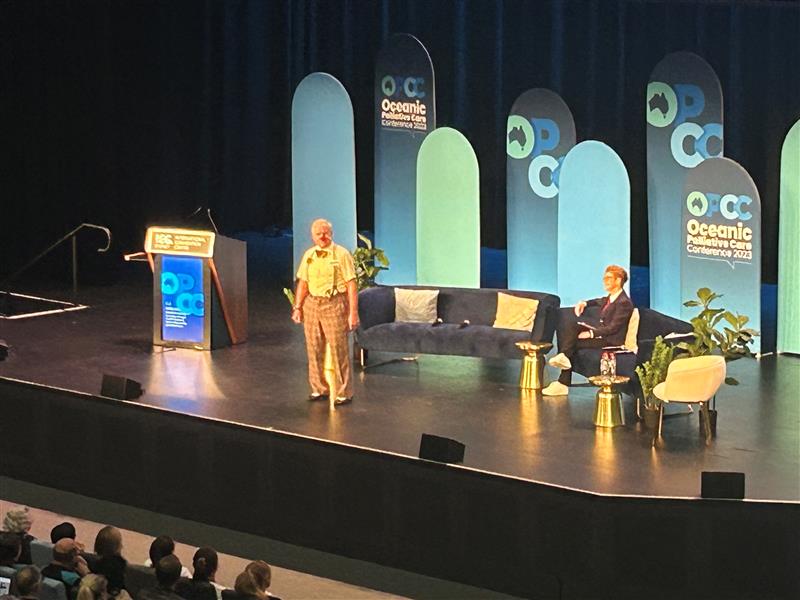Laughter Care Specialists: The benefits of connection through play and humour in palliative care
Laughter Care Specialists: The benefits of connection through play and humour in palliative care
by Megan Blandford
Friday, February 23, 2024
Laughter care specialists and researchers joined us at the 2023 Oceanic Palliative Care Conference to share how humour therapy can improve the quality of life of people with dementia.
More than half of people living in residential aged care have a diagnosis of dementia and can experience depression, apathy, anxiety, agitation, isolation and more.
There are many ways to help people with dementia, and one non-pharmacological treatment that’s showing promising signs is humour therapy.
“Its effect on the health and wellbeing of adults has been studied in a number of settings including palliative care, where it’s been found to help build relationships, improve relationships … and improve social engagement and quality of life,” says A/Prof Michelle DiGiacomo from the University of Technology Sydney.

What is humour therapy?
DiGiacomo explains how the laughter care program, provided by The Humour Foundation for people with dementia in residential aged care, works - “It is delivered by professional performers (Laughter Care Specialists, previously called Elder Clowns) who are trained to work with people with dementia,” she says.
“They are character-based clowns, they have a backstory and they have a one-word name. They don’t wear theatrical or stage makeup, but they do wear a red nose – this symbolises that they are different from anyone else in the aged care facility – and they bring with them a ‘licence to play’. They present as a clown friend, not as a health professional.”
A Laughter Care Specialist will attend a residential aged care facility once a week, for about two to three hours at a time. The same specialist attends the facility each week, helping to build familiarity and relationships with residents, family, and staff.
But don’t be fooled by the red nose and potential silliness – there’s more to the laughter care program than initially meets the eye. “The program is so much more than entertainment,” DiGiacomo says.
The serious business of being a clown
When a Laughter Care Specialist arrives at a residential aged care facility, they follow a process that respects the wishes and individuality of each person they encounter.
“There’s a journey, we start with connection, we get rapport, then we get play and then we get laughter,” says David Symons, Artistic Director at The Humour Foundation. “Play and laughter are core parts of being alive, and a clown can make you feel really, really important.”

Peter Djordjevic, who brings to life a character called Sonny, says his clown isn’t like those you may have seen before.
“It’s a sensitive clown - less loud and more one-on-one. I’m listening to the other person - where are they from, what are they like, what do they enjoy? Instead of asking them to step into our world, we step into their world,” he says.
“When I put the red nose on, it gives me permission to bring out the inner child and then residents bring out their inner child. The two of those talking together … we go to another place and it’s magic. It’s pure magic.”
Paul Wilson, also known as Archie, agrees that the nose is a special symbol. “The nose says I’m here to play, it makes that journey to play easier. As a clown … I have no authority, no agenda, no status, nothing to lose … I give those around me authority. As a clown I can take risks … and the clown accepts reality.”
Wilson used to be a Clown Doctor with children, but says he decided to work with adults when he realised, “Why should children get to have all the fun? Why can’t adults play and laugh?”
“I think play and acceptance can move mountains.”
Humour: the therapy that puts connection first
“It’s great to have a laugh with a stranger, but it’s really good to have a laugh with a friend. I think you need to develop a relationship with people to be able to go into all their emotional areas,” says Laughter Care Specialist David Wells (or Freddie).

It’s this relationship that everyone involved in the laughter care program agrees is the vital component. Connection is a powerful feeling for people with dementia who may be experiencing loneliness, depression or anxiety.
Djordjevic says, “Clowns are willing to give power, so people with dementia actually discover again that they have authority and wisdom.”
Wells adds, “A lot of people may think you’re infantilising adults as a clown, but really it’s the opposite of that. “You’re trying to make a difference, to improve the quality of that person’s life – and you might do that with humour, music, reminiscence work, or dancing.”
“It’s very meaningful work.”
Symons says it’s a beautiful way for people to not just connect with someone else, but to reconnect with who they are as an individual.
“This great life that’s been lived actually comes out of people, and so it’s really a celebration of humanity right to the very end.”
Video recordings of 23OPCC sessions involving A/Prof Michelle DiGiacomo and the laughter care program are now available to watch on demand via the 23OPCC Education Hub. Recordings are available free of charge to delegates as part registration. Subscriptions can also be purchased for between $200 and $400. More info and access - HERE.
